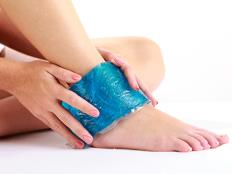Aunt Flo is Visiting
We've all been there—we count the days to our next half marathon and realize: Ugh, I'll have my period. From flow and odor to chafing from tampons and pads, Mother Nature knows how to throw a wrench into our race plans.Runner Stephanie Robinson has suffered from heavy periods and severe cramping since she was a teenager. Her top advice is to know your flow. "If you can accurately predict what happens on each day of your cycle, you can be better prepared when a race or important run falls during that special time," she says. Robinson also wears moisture-wicking underwear along with lined shorts to prevent visible spotting on heavy days.
Tampons top maxi pads for both odor control and chafing. Make sure yours is properly inserted, snip the string short and lube up with an anti-chafing product to avoid irritation. During longer runs or races, consider carrying extra tampons and wipes.
Don't let cramps stop you from logging miles, as exercise can actually ease stomach pain through the release of endorphins. If you're hurting, take it easy. Skip your scheduled speed workout and go for a light jog instead. Anti-inflammatory medication can prevent pain, but be careful not to down pills too often, as this can lead to kidney failure over time.
A Wee Problem
You're not alone. Many women struggle with incontinence. Pregnancy, childbirth and aging work to weaken pelvic and sphincter muscles, and running can create further pressure that leads to accidents.Deborah Sexton, a running mother of three, avoids wet shorts and embarrassment by wearing a urine protection pad when she runs. Choose the thickness depending on the length of your workout, and bring along an extra pad with a baggie for disposal. Sexton also uses wet wipes and lubricates the area to prevent chafing.
Just like any other muscle, your private parts will strengthen with a bit of work. Perform Kegel exercises to keep your bladder in check. Contract the muscles that you use to stop urine flow, hold for 10 seconds, relax and repeat 10 times. Do this three times a day to experience fewer leaks within 12 weeks.
If nothing works, see a doctor. Sexton's sister eventually opted for urinary incontinence surgery. "My sister recovered quickly and it more or less solved the problem for her," she says. Explore this and other medical options with your health care provider.
 Sign up for a race online.
Sign up for a race online.
Christine Hinton is a Road Runners Club of America certified coach and fitness expert. A competitive runner herself, she has been coaching beginners through elites for over 10 years.
- 2
- of
- 2
About the Author

Get ACTIVE on the Go


Couch to 5K®
The best way to get new runners off the couch and across the finish line of their first 5K.
Available for iOS | Android







Discuss This Article